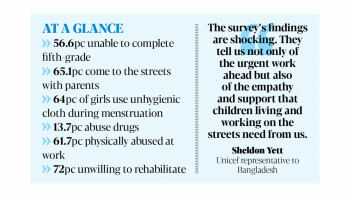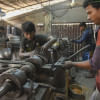Have we abandoned the street children?

We are deeply concerned about the widespread abuse of "dandy" – an adhesive glue widely available in hardware stores – among street children in Bangladesh. This toxic substance contains toluene, among other harmful chemicals, which causes intoxicating hallucinations, euphoria, and dizziness. A recent report in this daily has highlighted that street children primarily consume it because it helps them forget their hunger and detach themselves from the tough reality they live in. It is tragic that for most of these children, who earn less than Tk 100 a day, this glue is more affordable than food.
Reports show that, despite multiple studies and mitigation initiatives from government and non-government organisations, drug abuse is still prevalent among this extremely marginalised and deprived segment of our population. We find it appalling that most of these children are growing up in absolute neglect, abandoned by society and the state. The mitigation efforts, especially from the government, still heavily rely on persecution of the user, or rehabilitation programmes which are very limited in scope and scale. It is high time our policymakers understood that drug abuse among street children is a socioeconomic problem that cannot be solved through ad hoc and insensitive responses.
Studies show that broken families, lack of parental care, poverty and unemployment pushes these children towards homelessness and drug abuse. Many of these children are victims of physical abuse, forced prostitution, and even harassment from law enforcement personnel. It should come as no surprise that without any hope for a better future, these children feel abandoned by society, which in turn can lead them to abandon social norms and customs. As a result, many of these children tend to become addicted to other hard drugs and get entangled in small-scale criminal activities.
When asked, most of these children express a desire to attend school and get out of drug addiction and poverty. Like every citizen of this country, these children deserve an opportunity to lead a respectful life. We expect more sincerity from the government to address the underlying socioeconomic issues and take a comprehensive approach to safeguard street children from drug addiction and homelessness.


 For all latest news, follow The Daily Star's Google News channel.
For all latest news, follow The Daily Star's Google News channel. 








Comments